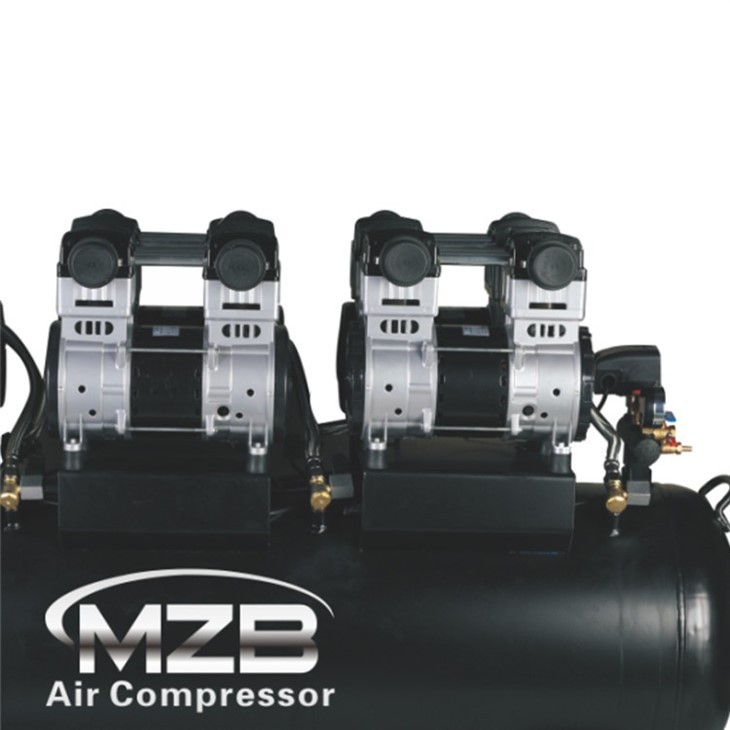Hey there! As a supplier of Oil Free Portable Air Compressors, I've seen firsthand how corrosion can mess up these nifty machines. Corrosion not only shortens the lifespan of the compressor but also affects its performance. So, in this blog, I'm gonna share some practical tips on how to prevent corrosion in an oil-free portable air compressor.
Understanding Corrosion in Air Compressors
Before we dive into the prevention methods, let's quickly understand what causes corrosion in oil-free portable air compressors. Corrosion is basically a chemical reaction between the metal components of the compressor and the surrounding environment. Moisture, oxygen, and certain chemicals in the air can all trigger this reaction.
In an air compressor, moisture is often the main culprit. When the compressor draws in air, it also takes in water vapor. As the air is compressed, the water vapor condenses into liquid water. If this water isn't properly removed, it can sit on the metal surfaces inside the compressor and cause rust and corrosion over time.
Keep the Air Dry
One of the most effective ways to prevent corrosion is to keep the air that enters the compressor as dry as possible. You can do this by using an air dryer. There are different types of air dryers available, such as refrigerated dryers and desiccant dryers.
Refrigerated dryers work by cooling the compressed air, which causes the water vapor to condense into liquid water. The water is then drained out of the system. These dryers are great for general applications and can reduce the moisture content in the air to a relatively low level.
Desiccant dryers, on the other hand, use a desiccant material (like silica gel) to absorb the water vapor from the compressed air. They can achieve even lower moisture levels than refrigerated dryers, making them ideal for applications where very dry air is required.
Regular Maintenance and Inspection
Regular maintenance is key to preventing corrosion in your oil-free portable air compressor. Here are some maintenance tasks you should perform regularly:
- Drain the Moisture: Most air compressors have a drain valve at the bottom of the air tank. You should drain the moisture from the tank at least once a day, especially if you use the compressor frequently. This will prevent water from accumulating inside the tank and causing corrosion.
- Check the Filters: The air intake filter and the oil filter (if your compressor has one) should be checked and replaced regularly. A dirty filter can restrict the airflow and cause the compressor to work harder, which can lead to overheating and increased moisture in the system.
- Inspect the Compressor: Take a close look at the compressor regularly to check for any signs of corrosion or damage. Look for rust spots, pitting, or any other signs of wear and tear. If you notice any problems, address them immediately to prevent further damage.
Use Corrosion-Resistant Materials
When choosing an oil-free portable air compressor, look for models that are made from corrosion-resistant materials. Stainless steel is a great choice for components that are likely to come into contact with moisture, such as the air tank and the piping. It's highly resistant to rust and corrosion and can withstand harsh environments.
Some compressors also have a protective coating on the metal surfaces to prevent corrosion. This coating acts as a barrier between the metal and the surrounding environment, reducing the risk of rust and corrosion.


Proper Storage
How you store your oil-free portable air compressor when it's not in use can also affect its susceptibility to corrosion. Here are some storage tips:
- Store in a Dry Place: Make sure to store the compressor in a dry, well-ventilated area. Avoid storing it in damp basements or areas where it might be exposed to rain or snow.
- Cover the Compressor: If possible, cover the compressor with a protective cover to keep dust and moisture off it. This will help prevent corrosion and keep the compressor in good condition.
Choose the Right Compressor for Your Needs
Not all oil-free portable air compressors are created equal. When you're shopping for a compressor, consider your specific needs and the environment in which you'll be using it. For example, if you'll be using the compressor in a humid or corrosive environment, you might want to choose a compressor that's specifically designed for such conditions.
We offer a range of high-quality oil-free portable air compressors that are built to last. Check out our 8 Bar High Pressure Oil Free Air Compressor, Super Silent Air Compressor, and Oilless Air Compressor. These compressors are made from high-quality materials and are designed to resist corrosion, ensuring long-lasting performance.
Protect the Exterior
Don't forget about the exterior of the compressor. The paint or coating on the outside of the compressor can also protect it from corrosion. If the paint is chipped or scratched, it can expose the metal underneath to the elements and cause rust.
You can touch up any damaged paint or coating with a suitable paint or corrosion-resistant spray. This will help maintain the protective barrier on the exterior of the compressor and prevent corrosion from spreading.
Conclusion
Preventing corrosion in your oil-free portable air compressor is essential for ensuring its long-term performance and reliability. By keeping the air dry, performing regular maintenance and inspection, using corrosion-resistant materials, storing the compressor properly, and choosing the right compressor for your needs, you can significantly reduce the risk of corrosion and extend the lifespan of your compressor.
If you're in the market for an oil-free portable air compressor or have any questions about preventing corrosion, feel free to reach out. We're here to help you find the perfect compressor for your needs and ensure that it stays in top condition for years to come.
References
- Compressed Air and Gas Institute (CAGI). "Best Practices for Compressed Air Systems."
- ASME (American Society of Mechanical Engineers). "Boiler and Pressure Vessel Code."
- Manufacturer's manuals for oil-free portable air compressors.





